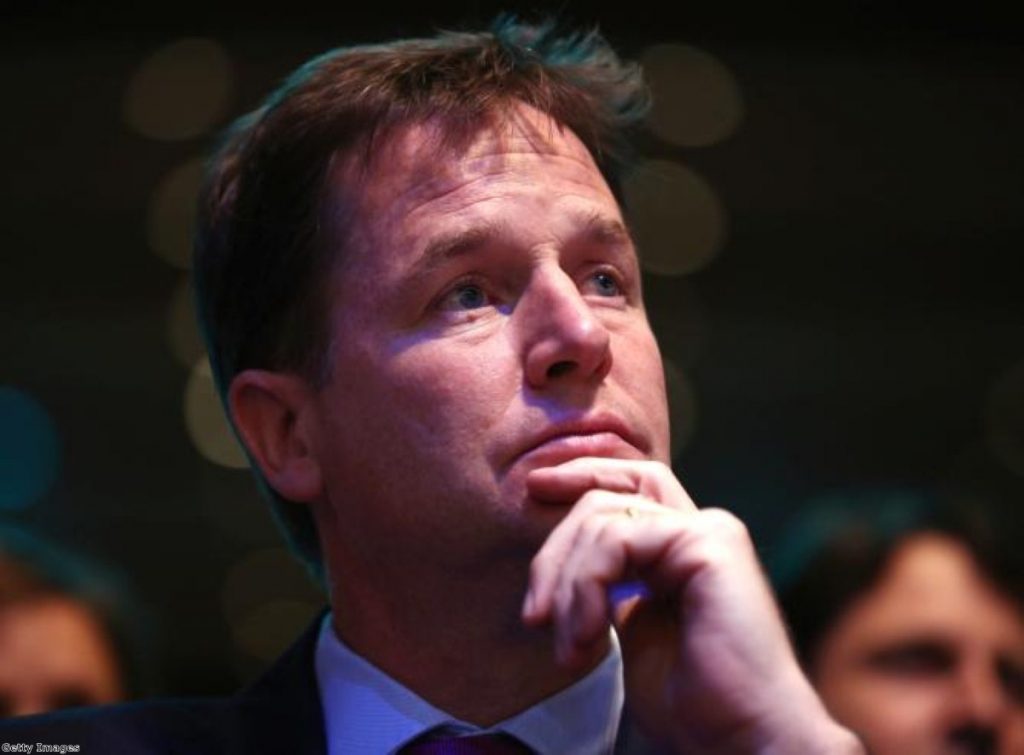No thanks to Vince: Clegg wins Lib Dem backing for coalition’s austerity drive
Nick Clegg has won his party's renewed support for the coalition's austerity drive, after rebels calling for a "rebalanced" economic policy were roundly defeated.
It followed a morning of media attention on business secretary Vince Cable's decision to absent himself from the debate, after a reported disagreement between him and Clegg.
Cable arrived for the second half of the debate, in time to see the party leader win applause from delegates for his defence of the coalition's uncompromising approach towards deficit reduction.
"Please be careful for what you wish for," Clegg said in his contribution to the debate.


"If we start messing about with the big goalposts we've stuck in the ground… we will destroy jobs and decrease prosperity."
Under pressure from the conference chair to wrap up his comments, he concluded: "The only people who will welcome what we do today are George Osborne and Ed Balls. You were brave last year – be brave again."
Delegates gathered at the conference hall in Glasgow then voted as Clegg had asked them to.
Liberal Democrat deputy leader Simon Hughes refused to back Clegg's lead on the rebel amendments calling for councils to be able to borrow more to fund housing, however.
Clegg's victory over grassroots party members linked to the left-of-centre Social Liberal Forum will strengthen the impression he is the strongest of the three mainstream party leaders this conference season.
But speculation over Cable's dissent could undermine that view. The business secretary is understood to have called on Clegg to water down party policy on the economy.
The deputy prime minister refused, setting the stage for a high stakes gamble that he would win the debate by taking the unusual step of speaking in it himself.
This morning Clegg played down the row over Cable's absence as a "storm in a teacup".
"I am the leader of the Liberal Democrats," he declared on the Today programme.
"I don't run a boot camp. I don't tell people when they have to turn up to meetings."
Aides of the business secretary had earlier suggested Cable was not attending the debate because he is spending the morning preparing for his speech to conference. He appeared about an hour after the debate started at 11:00 BST.
Cable did nothing in his speech to reduce the impression he is the leader of the Lib Dems' centre-left, reminding delegates he used to campaign for Labour and launching into a vicious attack against the Conservatives' "dog-whistle politics".
An unsuccessful grassroots uprising
The debate against the Lib Dem leadership's determination to stick with the coalition's austerity agenda was led by Naomi Smith and Gareth Epps, who had tabled amendments arguing for the coalition's approach to deficit reduction to be "rebalanced to give greater support for measures that raise employment and growth".
That assessment was rejected but Clegg backed their calls for "increased capital investment in people, business and infrastructure", a shift towards "robust regional economies" and a further shift in "the burden of fiscal consolidation" towards the wealthy.
Many party activists believe the Lib Dems would perform better at the next general election if it is seen to be trying to dilute the strictness of its approach to the economy.
The SLF's director, Prateek Buch, argued Clegg was ignoring "persistently high unemployment", high housing costs hitting living standards and a continued dependence on the City for economic growth.
"We should strive to raise investment and median wages up to and after the next election," Buch wrote in an article for the Independent newspaper before the vote.
"This means giving ourselves the tools – fiscal, monetary and structural – to bring about an economic recovery driven less by house prices and consumer debt, more by green investment and housebuilding."
Unlike other mainstream political parties in Britain, the Lib Dems give conference delegates a say in deciding their stance on a range of issues.
While leaders have suffered defeats in the past it is rare for the party leader to actually speak – raising the stakes for Clegg in a vote which it was critical for him to win.
Despite his victory the Lib Dem leader faces difficult midterm poll numbers.
A poll for the Independent newspaper by YouGov suggests 36% of Lib Dem voters believe the party has changed for the worse since 2010. That compares to just 20% who think it has got better.

